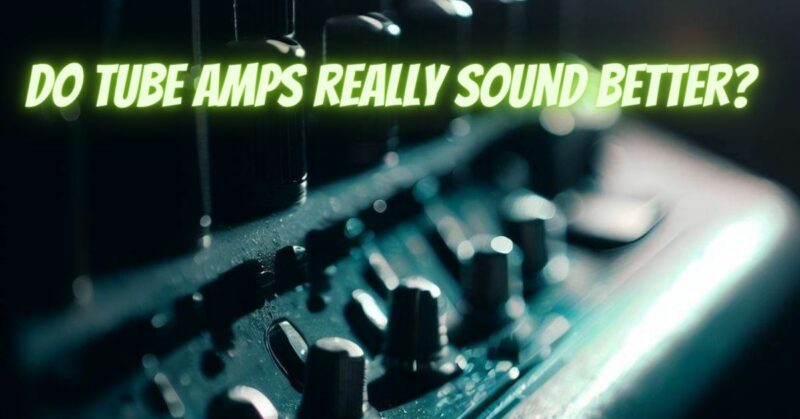The ongoing debate surrounding tube amps and their sonic superiority has captured the attention of audiophiles, musicians, and sound enthusiasts for decades. The allure of tube amplifiers lies in their warm, harmonically rich sound and distinctive characteristics. But the question remains: Do tube amps really sound better? In this article, we’ll delve into the factors that contribute to this debate and explore the unique qualities that tube amps bring to the audio landscape.
The Tube Amp Appeal
Warmth and Harmonic Richness: Tube amplifiers, also known as valve amplifiers, are celebrated for their ability to produce a warm and harmonically rich sound. This quality is attributed to the gentle way in which tubes amplify audio signals, introducing even-order harmonics that many listeners find pleasing and musical.
Distinctive Distortion: Tube amps generate a natural and often pleasing form of distortion when pushed into overdrive. This distortion can enhance the sustain and character of instruments, contributing to a more expressive and dynamic sound.
Interaction with Instruments: Many musicians believe that tube amps interact with instruments in a unique way, offering a responsive feel that translates into a more expressive playing experience. The tactile connection between the player and the amplifier contributes to the perception of superior sound quality.
Complex Tonal Palette: Tube amps can produce a wide range of tones, from clean and transparent to heavily saturated and gritty. This versatility allows musicians to achieve a diverse sonic palette, catering to various musical genres and playing styles.
Factors Influencing the Perception
Personal Preference: The perception of whether tube amps sound better is often influenced by personal preference. Some individuals are drawn to the warmth and nostalgia associated with tube amp sound, while others may prefer the clarity and precision of solid-state amplifiers.
Context and Application: The musical context and application also play a role. Tube amps are particularly cherished in certain genres, such as blues, jazz, and classic rock, where their inherent characteristics can enhance the musical expression.
Nuances of Sound: It’s important to note that the “better” sound quality attributed to tube amps is not universal. What tube amps offer is a distinctive coloration and tonal texture that may appeal to specific tastes and musical contexts. The perception of better sound is tied to the desire for specific tonal qualities that tube amps can provide.
Subjectivity and Expectations
Ultimately, the question of whether tube amps really sound better is rooted in subjectivity and expectations. Different listeners prioritize various aspects of sound quality, such as clarity, warmth, distortion, or precision. The allure of tube amps lies in their ability to offer a unique sonic character that resonates with those seeking their particular tonal qualities.
The debate over whether tube amps truly sound better is complex and multifaceted. While they may not universally outperform all other amplifier types, tube amps undeniably bring a distinct charm and character to the audio experience. The appreciation of tube amps is an exploration of personal taste, musical context, and the desire for a sound that captures the essence of vintage warmth and harmonic richness. Whether they are deemed “better” ultimately depends on the listener’s preferences and the sonic qualities they value most.


